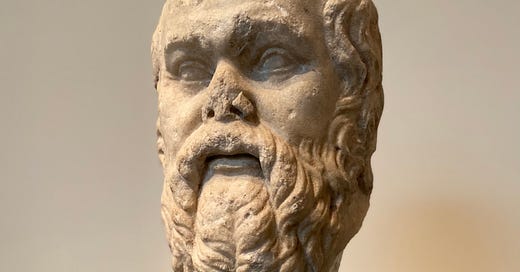When the pandemic first hit, I sat at my computer for 12 hours a day writing blog posts, tweets, and drafts of op-eds for the editors at the top newspapers and journals. Because schools and kids are my thing, I focused on how the school closures were going to really screw up kids and derail the public education system. I have a track record of writing for some big name publications, so I assumed that an editor at one of those publications would bite.
But none did. I couldn’t find a larger audience for my op-eds. Almost all the editors ignored me. One told me that he liked my piece, but schools were less important than other issues at that time. I did publish one piece in USA Today about how special education kids would suffer without services, but that was it. At that time, anyone who worried about the impact of school closures was labeled “anti-teacher.”
Luckily, I have a newsletter, so I posted my worries here.
From March 20, 2020 “It's The End of Public Education As We Know It, But I Feel Fine!”
What I've witnessed in the past week is the absolute implosion of public education. Who knew that this 100-year old institution would falter so severely? I suppose that at this moment in time, schools are the least of our problems, but I'm still going to talk about them anyway.
From February 21, 2021 “Why School Closures Are Such a Disaster”
So, when schools closed, folks like my neighbors in Washington Heights stopped getting their meals. Special ed kids stopped getting therapy for physical disabilities, mental health issues, and severe behavioral issues. Women stopped working. Because community life sucks in America, kids became isolated from other human beings. Because housing sucks in this country, kids are crammed into one bedroom apartments with their entire extended family breathing in the same COVID-filled air all day.
In an interview yesterday, a prominent psychologist and author told me that when the schools open up again, she believes that the mental health issues among children will be so intense that schools alone won’t be able to help. The federal government will need to create new programs to reach kids. She didn’t think that schools had the bandwidth to solve this problem alone. Our country’s poorly financed schools have simply too much on their plates.
And even from just a couple of weeks ago, “The Unraveling of Public Education”
The problems in public schools are mounting: a fluid workforce, culture wars over curriculum, and pissed, mobilized parents. Together, those problems are a perfect storm that could topple a century old institution. Twenty years ago, I wrote my dissertation on the politics of school vouchers. The conclusion discussed why the privatization of education would not happen in our country, despite the efforts of a diverse group of supporters. Today, I am less certain of that conclusion.
Yes, this newsletter is FULL of happy news. If you want to read more of my Cassandra predictions, here are my archives.
Because I’m one of those girls, I have to say, “I TOLD YOU SO.” Others are starting to report on the serious issues in public education. An article in this week’s New York Times explains that “the pandemic has supercharged the decline in the nation’s public school system in ways that experts say will not easily be reversed.” There are 1.2 million fewer students in public schools in just two years.
Where did the kids go? Some are being home schooled, others are in private schools. Some have completely dropped off the map. A whole lot moved with their families to Montana.
Okay, let’s just leave aside that massive tragedy of all the kids who dropped out. With fewer kids in schools, there is less federal money for the schools, because those funds are pegged to the number of kids in the school. With less money in the school coffers, big changes will happen. They’re going to have to consolidate schools and fire teachers.
Now, does consolidation of schools mean the end of public education? No. Honestly, we have too many little schools in my area of the country with redundant, over-paid administrators. It wouldn’t hurt to cut back on varsity sports or specialized clubs and programs. A budget crisis could provide an opportunity to bypass union red tape, and to streamline/modernize schools. While public education isn’t totally finished, all these pressures certainly signal that tomorrow’s schools will be very different from today’s schools.
If I had a wishlist for a streamlined school system, it would include the prioritization of academics over fad curriculum, a commitment to equity, efficiency of administration, and improved teacher education. A return to basics, if you will.
I want kids to go to a building where they read books for seven hours a day and talk about those books with people, who are hundred percent in love with books and ideas. Kids who have trouble reading would get extra help. And then everybody would go home. Other stuff, like clubs and sports and drama and fancy programs, can happen privately or through the town services.
Sometimes a crisis can bring about a much-needed revolution. Let’s cross our fingers and hope for the best.
LINKS
I wrote about the latest dramas as we’re helping our son with autism:
On the blog, we chatted about getting plastic surgery and our careers.
I’m a College Student with a Disability. Stop Treating Me Like a Child.
A big art collection topped $922 million at Sotheby’s.
Aided by a remote workplace, people are moving to Bozeman, Montana for the quality of life. And it’s overwhelming their schools.
The New York Times editorial board came out against student loan forgiveness.
A new study backs up claims about grade inflation.
Loved this article about the research on what makes us happy. It’s not our careers. It’s being outside.
Young people are like YOLO and are spending/not saving. Remind to talk about the long lines outside the luxury shops in the fancy malls near us.
PICTURE: Aged, vintage reds, Mixed topics, $60 per foot.
WATCHING: Last season of Ozark, Finished Dr. Strange, As We See It. Love them both.




